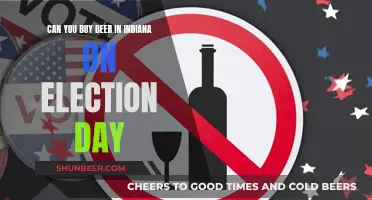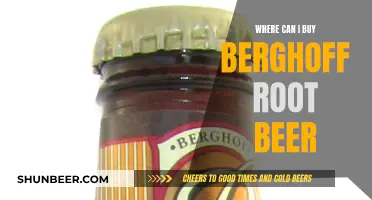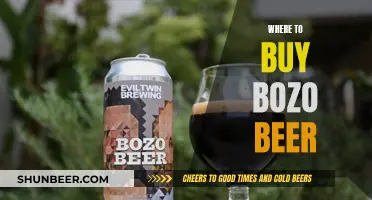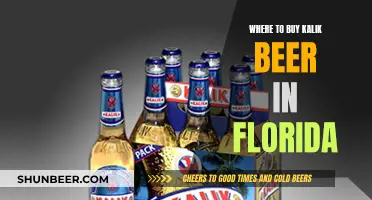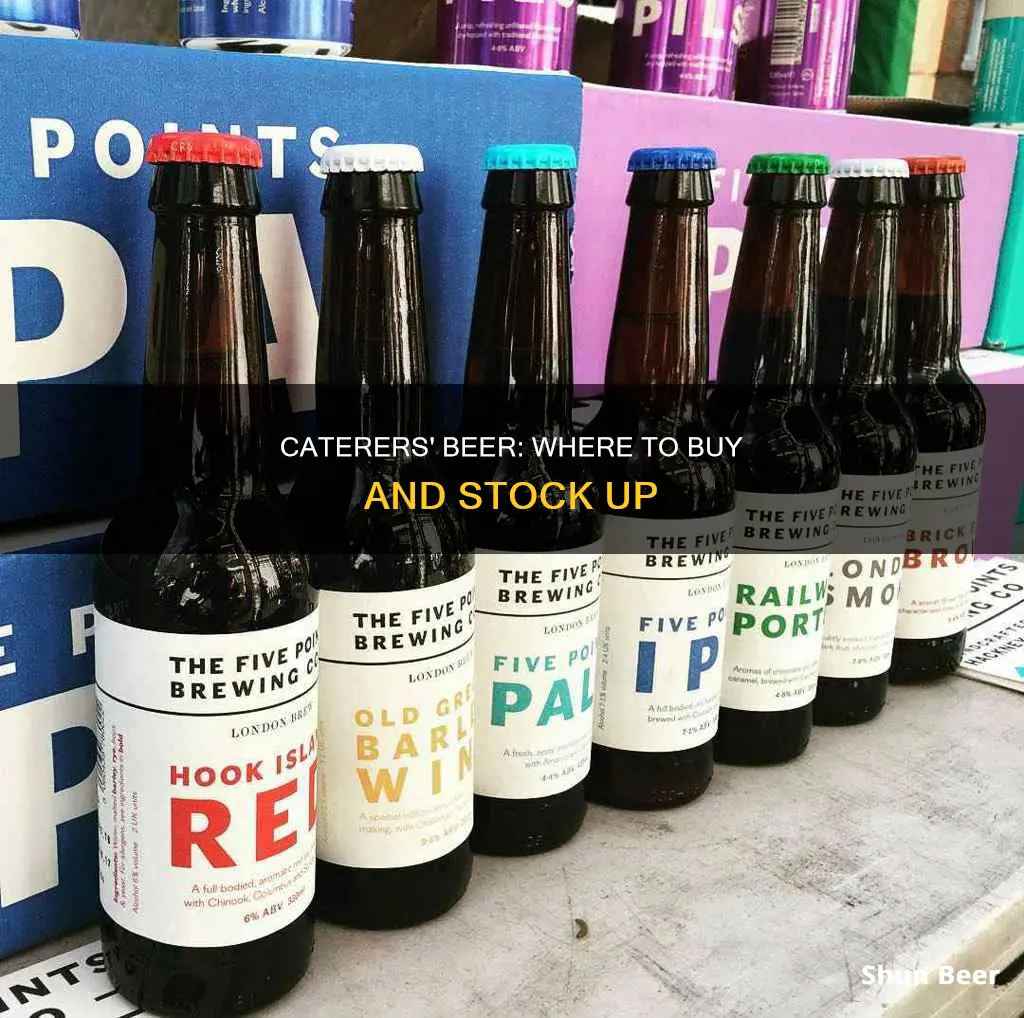
When it comes to catering, the options for acquiring beer depend on the location and the type of license held by the caterer. In some places, like Florida, licensed alcoholic beverage caterers can purchase beer directly from licensed vendors, including breweries, wineries, and distilleries, instead of going through distributors. This allows for direct sales of kegged, bottled, or canned products to caterers. However, specific requirements, such as the need to operate a bar with a particular license, must be met.
Caterers also need to consider factors like the type of event, day of the week, and host preferences when determining the quantity and type of beer to buy. They may offer standard or top-shelf packages, ensuring they have popular local options to cater to different tastes. Estimating alcohol quantities can be challenging, and caterers often develop formulas or work with venues and suppliers to manage returns or minimize waste.
What You'll Learn
- Licensed caterers in Florida can buy beer directly from licensed vendors
- Caterers may be able to return unopened alcohol to the retailer
- A catering license allows the sale of beer at various locations in a city or county
- Caterers may be restricted to only selling alcohol on a by-the-drink basis
- The type of beer served depends on the preferences of the host

Licensed caterers in Florida can buy beer directly from licensed vendors
Licensed alcoholic beverage caterers in Florida can purchase beer, wine, and spirits directly from licensed vendors, including brewery taprooms and winery tasting rooms. However, they cannot purchase from a distiller's gift shop. To be licensed, caterers must operate a bar with a 4COP quota license or have a 13CT license, issued by the Florida Division of Hotels and Restaurants.
The 13CT license is only available to food caterers who must derive at least 51% of their gross food and beverage revenue from the sale of food and non-alcoholic beverages at each catered event. Alcoholic beverages not used at a catered event must be left with the customer or returned to the vendor.
Before selling to a caterer, a brewery taproom or winery tasting room should take reasonable steps to confirm that the caterer holds a valid 13CT license. This includes checking that the caterer meets the 51% revenue requirement and is licensed by the Division of Hotels and Restaurants.
By allowing licensed caterers to purchase beer directly from vendors, Florida provides flexibility and convenience for those in the catering industry, enabling them to source alcoholic beverages for their events efficiently.
Florida's Non-Alcoholic Beer Laws for Minors Explained
You may want to see also

Caterers may be able to return unopened alcohol to the retailer
In Florida, licensed alcoholic beverage caterers can purchase beer, wine, and spirits directly from licensed vendors, instead of having to go through distributors. This means that a brewery taproom or winery tasting room can sell kegged, bottled, or canned products directly to a licensed caterer. Licensed caterers must also provide food at the event and cannot provide only alcohol.
Licensed alcoholic beverage caterers in Florida are unique within the state's Three Tier System because they are allowed to purchase alcohol directly from licensed vendors. A 13CT license is only available to food caterers licensed by the Florida Division of Hotels and Restaurants. A 13CT caterer must derive at least 51% of its gross food and beverage revenue from the sale of food and non-alcoholic beverages at each catered event. Alcoholic beverages not used at a catered event must be left with the 13CT caterer's customer or returned to the vendor.
It is recommended that caterers ask their suppliers if they can return unopened bottles to avoid dealing with cash flow issues from buying too much or wasting product. If the supplier does not allow returns, caterers should consider purchasing generic brands that can be used at the next event.
Buying Beer on Sundays in Texarkana, Texas: What's the Deal?
You may want to see also

A catering license allows the sale of beer at various locations in a city or county
A catering license allows the sale of beer, wine, and liquor at various locations in a city or county. The specific requirements for obtaining a catering license can vary depending on the region. For example, in Tennessee, a caterer must have a permanent catering hall, a commercial kitchen facility, and be licensed by the Tennessee Department of Health. They are also required to notify the TABC of any catered event at least two full business days in advance.
In Florida, there are different types of licenses for caterers, such as the 13CT license and the 4COP quota license. Licensed alcoholic beverage caterers in Florida can purchase beer, wine, and spirits directly from licensed vendors. This means that a brewery taproom or winery tasting room can sell kegged, bottled, or canned products directly to a licensed caterer. However, a distillery's gift shop cannot sell directly to caterers.
When it comes to hosting catered events, Florida breweries, wineries, and distilleries must follow certain regulatory steps, especially if the event is held in the licensed manufacturing space. Generally, no special steps are required if the event takes place in a taproom or tasting room, as these spaces are already licensed for the retail sale of alcoholic beverages.
It is important to note that the rules and regulations regarding catering licenses and alcohol sales can vary by state and even by city or county. As such, caterers should always ensure they are complying with the specific requirements of their location.
Beer Availability at USC Football Games
You may want to see also

Caterers may be restricted to only selling alcohol on a by-the-drink basis
In the United States, the laws surrounding the sale and distribution of alcohol vary from state to state. In Florida, licensed alcoholic beverage caterers are unique within the state's Three Tier System as they are permitted to purchase beer, wine, and spirits directly from licensed vendors, rather than distributors. A licensed alcoholic beverage caterer in Florida must operate a bar with a 4COP quota license or have a 13CT license, which is only available to food caterers licensed by the Florida Division of Hotels and Restaurants.
In Tennessee, a catering license allows the sale of liquor, wine, and high-gravity beer in cities, counties, or municipalities that have authorised the sale of alcoholic beverages for on-premise consumption. Licensed caterers in Tennessee may only sell alcoholic beverages on a by-the-drink basis and must also provide food at the event. They are also required to notify the Tennessee Alcoholic Beverage Commission (TABC) of any catered event at least two full business days prior to the event.
The laws in each state can impact the way caterers source and sell alcohol. For example, in Florida, a licensed alcoholic beverage caterer with a 13CT license must derive at least 51% of its gross food and beverage revenue from the sale of food and non-alcoholic beverages at each catered event. This means that caterers with a 13CT license cannot sell alcohol without also providing food.
Additionally, the type of license held by an alcohol retailer in Florida can impact whether they are permitted to provide bartending services for an event. For instance, an alcohol retailer with a 2APS license can supply a private party with beer or wine for an open bar event but cannot provide bartending services.
When it comes to purchasing alcohol for events, caterers and event planners must consider various factors, such as the type of event, the number of guests, and the expected consumption rate. It is notoriously difficult to estimate how much alcohol to buy, and caterers often develop formulas or guidelines to ensure they buy the right types and amounts of beer, wine, and liquor.
In some cases, caterers may have agreements with liquor stores or wholesalers to buy back any unopened alcohol after an event. However, it is important to note that these agreements may not include opened cases of beer, which can create challenges for caterers when it comes to providing a diverse beer selection.
Buying Beer in England: Underage Access and Loopholes
You may want to see also

The type of beer served depends on the preferences of the host
The type of beer served at an event often depends on the preferences of the host. While caterers and mobile bartenders may have a formula to determine the right types of beer to serve, the host's preferences are paramount. For instance, if the host is a wine lover, they may opt for a wine-focused event with a few beer options. On the other hand, a host who is a beer enthusiast may request a wide variety of craft beers, including local or seasonal options.
In some cases, the host may be limited by the venue's restrictions on outside alcohol. Some venues do not allow outside caterers and have their own in-house bar or catering services. In such cases, the host may need to work within the constraints of the venue's offerings. However, even in these situations, the host can express their preferences and make special requests. For example, they may be able to get their desired beer options by purchasing them separately and bringing them to the venue.
Additionally, the type of event and the guest demographic can influence the beer selection. For instance, a casual gathering may call for a simpler selection of beers, while a more formal event might warrant a wider range of options. The age group of the guests can also be a factor, as younger guests tend to favour beer and cocktails, while older guests often lean towards wine.
Ultimately, the host's preferences play a crucial role in determining the type of beer served at an event. By communicating their wishes to the caterer or venue, the host can ensure that their event offers a beer selection that aligns with their tastes and suits the occasion.
Spotted Cow Beer: Minnesota's Availability Mystery
You may want to see also
Frequently asked questions
It depends on the region and the type of license the caterer holds. For example, in Florida, licensed alcoholic beverage caterers can buy beer directly from licensed vendors, including breweries, wineries, and distilleries.
It depends on the agreement with the supplier. Some suppliers will allow unopened bottles to be returned, but this may not be the case for opened cases of beer.
Yes, you can request specific beers from the caterer. However, it may be difficult for caterers to provide a wide range of options due to distribution and freshness concerns.
No, licensed caterers are required to provide food at the event and cannot provide only alcohol.


